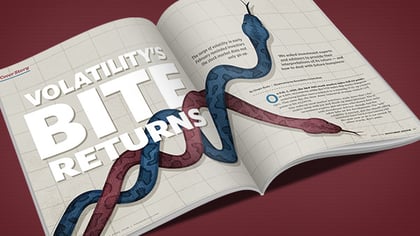Prognosticators, investment firms, advisors and even so-called “fear indexes” have been warning that the good times in the stock market won’t last forever.
Vanguard explained in a December outlook report that it saw a “risk that a cyclical rebound in economic fundamentals could cause a market repricing — ultimately mistaking the ‘the trend for the cycle.’ In the U.S. specifically, a wage or inflation hike could lead markets to reprice a more aggressive path of policy rate normalization by the Federal Reserve, ending a long period of low volatility.”
The CBOE Volatility Index or VIX — which many refer to as the “risk index” or “fear gauge” because it measures implied volatility in the S&P 500 Index — had been rising from its single-digit doldrums since mid-January. The Friday before Feb. 5, the VIX had been at 17.31, but it soared 116% to 37.32 that Monday — the largest move in its history. The greatest move before that spike was its 64% jump of February 2007.
After any huge market (down) move, people typically search for a villain. In 1987, it was stock index futures, in the 2000s it was high frequency traders, and lately it seems to be the VIX index, or at least the alleged manipulation of it.
Shortly after the market rout, an anonymous whistleblower wrote to the Commodity Futures Trading Commission, stating that “unethical” trading firms had manipulated the VIX “by simply posting quotes on S&P options … without needing to physically engage in any trading or deploying any capital,” according to a Bloomberg report. Next, a class action lawsuit was filed in the U.S. District Court for Northern District of Illinois, which alleged that unnamed traders were able to rig the VIX options and futures markets via settlement prices. The CBOE has dismissed the whistleblower’s charges, noting that he has “a fundamental misunderstanding of the relationship between the VIX Index, VIX futures” and related exchange-traded products.
And there are other forces at play. John Toohey, head of equities for USAA, said that “the proliferation of ETFs has changed market trading dynamics. Some data indicate that the turnover of equity ETFs now exceeds the turnover of traditional long only equity managers.” The full impact ETFs will have on market volatility remains unclear, he adds.









 April 02, 2018 at 03:30 PM
April 02, 2018 at 03:30 PM











